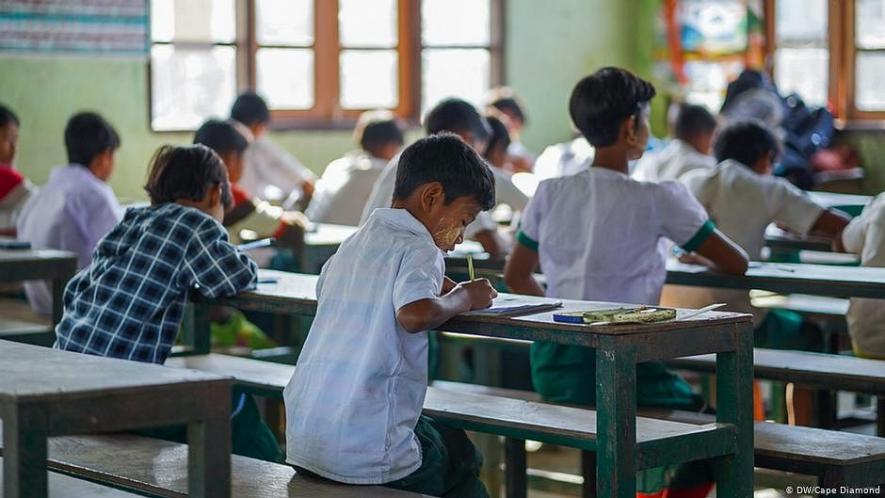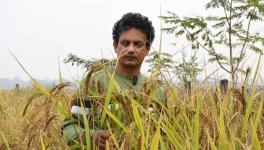Alternate Education Centres Opened in West Bengal to Help School Dropouts During Pandemic

Representational Image. Image Courtesy: Social Media
Kolkata: During the ongoing pandemic, school education is virtually closed in West Bengal, as online education has only been able to cater to 5% to 6% of the total school students in the state. Amidst this hopeless situation, Bangiyo Shakkhorota Prasar Samity (BSPS) has come up with the initiative of establishing alternative education centres in rural areas of the state to cater to children. Many of these rural students have been forced to drop out of school after nearly 18 months of not having access to education.
Talking to NewsClick, Bikash Dey, a leading activist of BSPS and the secretary of the organisation’s South 24 Parganas district committee, said these literacy centres were once the reason West Bengal was able to thwart the 1992 riots in the state after demolition the Babri Masjid. However, with communal politics playing out in the state at present, the literacy movement initiated by the Left movement is facing hurdles in setting up new centres.
Even before the pandemic, some literacy centres were functioning in several parts of North 24 Parganas, South 24 Parganas, West Medinipur, and Jhargram districts. The objective of these alternative education centres has been to bring the children who drop out of school back into the periphery of education, and bring their parents within the ambit of adult education. BSPS initiatives in this regard are growing in Jalpaiguri, South and North Dinajpur, and Cooch Behar districts, Dey told NewsClick.
While there is no particular name for these alternative education centres, some of them are referred to as Osomoyer Pathshala (study centre for difficult times). Some other such centres have been named after doyens of arts, literature, science and culture.
Amidst these trying times, BSPS has also been able to expand their work in the interiors of Sagar islands in Sagardwip, Kakdwip, Sandeshkhali, in Mousumi dwip of Namkhana. They have organised multiple medical camps in these areas after Cyclone Yaas, and have been trying to raise awareness among the local residents about the importance of healthcare and education.
Talking to NewsClick, Anup Sarkar, general secretary, BSPS, alleged that state government-run programmes for increasing literacy have not been functioning properly since a long time. The literacy rate of West Bengal is 76%, according to recent estimates, which means nearly two crore people in the state are illiterate.
Sarkar said the literacy rate can only be increased if the state government takes responsibility. It may be recalled that until 2005, the West Bengal government used to run all the literacy centres in the state and the literacy movement of the state had gained international recognition under the Left Front government, headed by late Jyoti Basu, and had won the international Noma award in 1998. However, after 2011 (when Left rule ended), there has been a lull in the literacy movement as the state government, led by the Trinamool Congress, has completely withdrawn from it.
Literacy rates are highest in East Medinipur and Kolkata (over 85%), moderate in Darjeeling, Cooch Behar, Burdwan, Nadia, North 24 Parganas, Hugli, West Medinipur, Howrah, South 24 Parganas (75-85%), low in Jalpaiguri, Dakshin Dinajpur, Murshidabad, Birbhum, Bankura, Purulia (65-75%) , and very low (below 65%) in Uttar Dinajpur and Malda.
BSPS also runs a residential girls’ school named after Ishwar Chandra Vidysagar in Purulia, which has 450 students and 22 teachers.
Sarkar said the current number of dropouts in primary schools would be a cause of concern in the near future, adding that while many states have already started taking initiatives to reopen schools and colleges, the West Bengal government has made no such move yet.
While overall, the literacy rate in the state has increased over the years, it is growing at a much slower rate than most Indian states. Also, there are wide gaps in literacy rates between men and women, and between urban and rural areas.
Get the latest reports & analysis with people's perspective on Protests, movements & deep analytical videos, discussions of the current affairs in your Telegram app. Subscribe to NewsClick's Telegram channel & get Real-Time updates on stories, as they get published on our website.
























